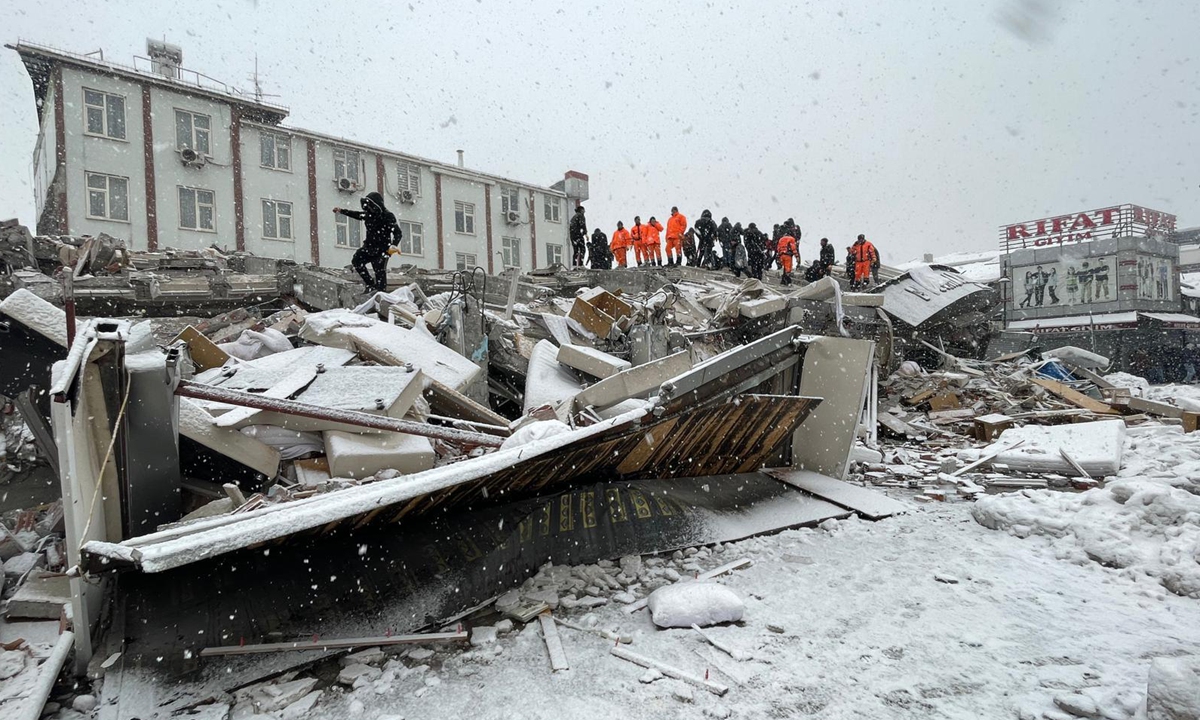
Rescue work is underway after a massive earthquake hit southern provinces of Turkey on February 6, 2023. More than 2,000 people were killed and thousands of others injured as of the press time after strong earthquakes jolted parts of Turkey and northwest of Syria Monday. Photo: VCG
The powerful earthquakes that occurred in southern Turkey on Monday caused severe casualties in Turkey and Syria. In the face of serious natural disasters, human society has revealed its fragile and resilient sides. After the earthquake, many countries and regions around the world, including China, have expressed their condolences and provided help to Turkey and Syria. It is worth mentioning that Sweden, which recently has had tense relations with Turkey, and Israel, an "old enemy" of Syria, have temporarily put aside their political differences and actively participated in disaster relief efforts. This has created a moving scene where the two countries in need have gained global support.
Turkey and Syria, particularly the latter, have long been spots of conflict in international geopolitics. Syria has already experienced the chronic pain of years of turmoil and war, and strong earthquakes are really intensifying the pain. The international community should strive to reach the common goal of providing timely help to the victims and preventing a more serious humanitarian disaster from happening due to the earthquake. Thus, the international community, especially the major powers, needs to achieve unity and coordination at a larger level.
Huge disasters are often characterized by shocking scenes that create a strong sense of shared destiny in a short period of time, as well as the expectation and call for human solidarity. This kind of understanding, which has been gained at a tragic cost, is invaluable and should be widely and firmly practiced in human society. However, there is a huge gap between reality and the ideal, which is widening because of some forces. Recently, humanity has faced common challenges, one after another, ranging from the COVID-19 pandemic to regional conflicts to climate change. However, it has not facilitated the formation of the true solidarity necessary to deal with global issues. The dysfunction of relations between major powers, the disorder of the international order, and the imbalance of global governance are the more profound crisis of human society at present, wasting the disasters and sufferings that humanity has endured time and again.
Many people have the same feeling that since entering the third decade of the 21st century, international relations seem to have fallen into the quagmire of accelerated regression. Whether it is populism and trade protectionism in the economic field, or zero-sum game and geopolitical conflicts in the international political field, they are all escalating and an inertia that is continuously deteriorating has even been formed. Against this background, it is even more valuable for countries around the world to jointly support Turkey and Syria to resist disasters; but this kind of unity should not only be short-lived in the face of a sudden global crisis. We hope it can continue to warm the world.
Needless to say, there isn't much optimism on how long the current unity or harmony can last. Just a few days before the earthquake, some Western countries including the US, the UK, Germany and France temporarily closed their consulates in Istanbul or issued security warnings about Turkey citing "security concerns," triggering fierce protests in Turkey, which can be called a "diplomatic earthquake." The matter has not been resolved. It is conceivable that in the land where the earthquake occurred, disaster relief and post-disaster reconstruction may still encounter obstacles and resistance at the geopolitical level.
And we still need to mention Syria, a country that has been suffering from war for more than a decade, which has caused more damage than an earthquake. However, it is regrettable that the US still cannot let go of its geopolitical obsession at this moment, and has ruled out any possibility of contacting the Syrian government. But as we all know, the Syrian government is the main executor of the post-earthquake rescue operations. Meanwhile, Washington has also ignored calls to lift sanctions on Syria "immediately" so that aid can be provided.
The Chinese sci-fi movie The Wandering Earth 2, which is currently being screened, shows that true unity and cooperation can be achieved when the entire human race is at a critical juncture of life and death and will be destroyed if humanity doesn't unite. We hope that in the real world we will not wait until the last minute to be forced to make a choice, but will be one step ahead, and take the initiative as soon as possible.
Every time after a disaster, people sympathize with the victims from the bottom of their hearts, and sincerely hope to provide help as much as they can. It is a shining part of universal humanity. It allows us to see the deep strength of building a community with a shared future for mankind, and be confident that the world will eventually become a better and warmer place.



